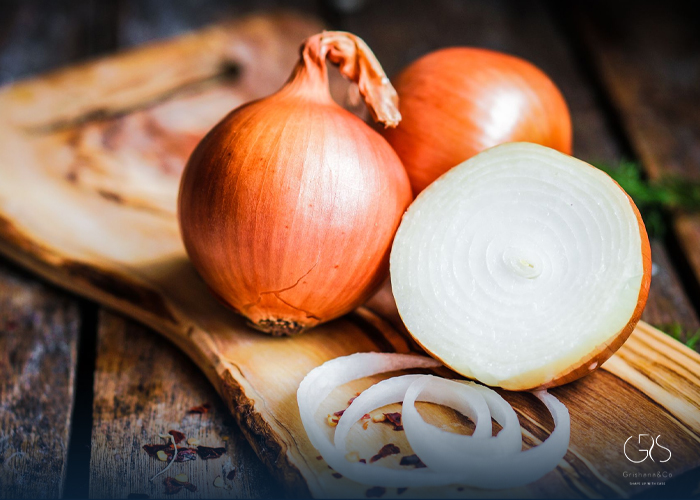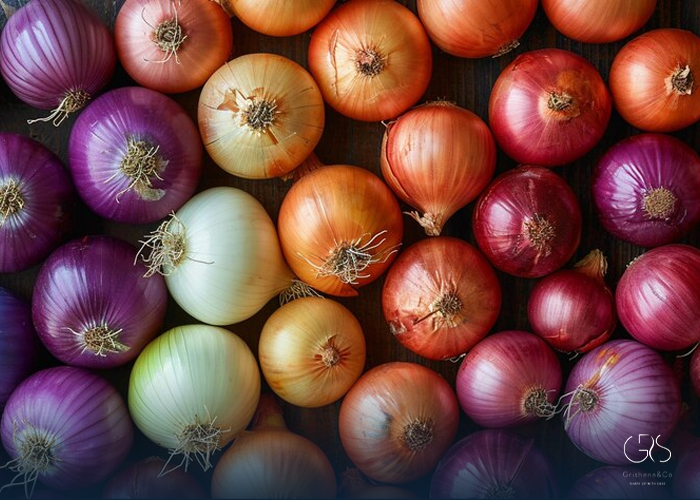Onion, often referred to as the “king of vegetables,” is a staple in numerous culinary traditions around the world. But beyond its undeniable flavor-enhancing quality, onion also boasts an impressive array of health benefits that have been acknowledged and utilized for centuries. From boosting immune function to reducing the risk of chronic diseases, onion has earned its reputation as a potent superfood.
Nutritional Profile of Onions
Before delving into the specific health benefits of onions, it is crucial to understand their nutritional composition. Onions are low in calories but rich in essential nutrients, making them an ideal addition to a healthy diet. A medium-sized onion contains roughly 44 calories and provides a good source of dietary fiber, vitamin C, and various minerals, including potassium and folate.
(Read more about benefits of vitamin C)

Immune-Boosting Properties
One of the most noteworthy health benefits of onions is their ability to bolster the immune system. Onions are packed with antioxidants, such as quercetin, which have been shown to possess anti-inflammatory, antiviral, and immune-boosting properties. According to a study published in the journal “Experimental Biology and Medicine,” the consumption of quercetin-rich foods, such as onions, may contribute to enhanced immune function by protecting the body against oxidative stress and inflammation (Ferry, 2011).
Cardiovascular Health
In addition to their immune-boosting properties, onions have been linked to improvements in cardiovascular health. Research indicates that the sulfur compounds present in onions may help lower blood pressure and cholesterol levels, thereby reducing the risk of heart disease. A meta-analysis published in the journal “Critical Reviews in Food Science and Nutrition” concluded that the intake of onions is associated with a reduction in both systolic and diastolic blood pressure, highlighting their potential role in the prevention of hypertension and related cardiovascular complications (Ried, 2013).
Cancer Prevention
The potential role of onions in cancer prevention has been a subject of extensive research. Epidemiological studies have suggested that regular consumption of onions may be associated with a decreased risk of certain cancers, particularly those of the stomach and colorectal region. The National Onion Association reports that the organosulfur compounds found in onions have demonstrated anti-cancer effects by inhibiting the growth and proliferation of cancer cells, as well as inducing their self-destruction (National Onion Association, n.d.).

Digestive Health
Onions contain prebiotic fibers that act as food for beneficial gut bacteria. These fibers can promote the growth of a healthy microbiome in the digestive system, contributing to improved overall digestive health and regularity. Furthermore, the sulfur compounds in onions have been shown to possess antibacterial properties, which may help combat harmful bacteria in the gut and reduce the risk of digestive infections.
Different Onion Benefits:
- Yellow, Red, and Pink Onions: These varieties contain more quercetin, an antioxidant flavonoid, compared to white onions. Quercetin has anti-inflammatory, antiviral, and anticancer properties.
- Red, Green, and Yellow Onion Essential Oils: These oils exhibit strong antibacterial properties.
- White and Yellow Onion Extracts: These varieties have lower antibacterial properties compared to red onion extract.

Risks Associated with Onions:
- Food Allergy: Some individuals may be allergic to onions, although this is not a common allergen.
- Gastrointestinal Problems: Eating onions can trigger heartburn or exacerbate symptoms of irritable bowel syndrome (IBS).
- Heavy Metal Consumption: Onions can contain high levels of lead and cadmium, which are heavy metals and can be toxic in high concentrations.
Tips for Consuming Onions:
To prepare onions without the sulfur gas affecting your eyes:
- Chill the Onions: Refrigerate onions before cutting.
- Cutting Safety: Cut onions near a vent with a candle lit nearby.
- Protective Gear: Consider using goggles while cutting onions.
For incorporating onions into your diet:
- Raw Consumption: Enjoy onions raw in salads.
- Cooking Methods: Bake, boil, grill, fry, roast, or steam onions in various dishes.
- Versatile Use: Utilize onions as a spice or in juicing for added flavor and nutrients.
Diverse Perspectives on Onions
While the health benefits of onions are well-documented, it is important to acknowledge diverse perspectives on their consumption. For some individuals, particularly those with gastrointestinal conditions such as irritable bowel syndrome (IBS) or acid reflux, onions may exacerbate symptoms and cause discomfort. In such cases, moderation or alternative options should be considered to accommodate individual dietary needs.
Moreover, some cultural and culinary practices may present variations in the utilization of onions. For instance, in certain cuisines, onions are a ubiquitous ingredient, while in others, they may be less commonly used due to flavor preferences or culinary traditions. Understanding and respecting these diverse perspectives is essential in promoting inclusive and culturally sensitive discussions about the health benefits of onions.
Conclusion
Onions deserve their status as a versatile superfood due to their impressive health benefits and culinary versatility. From supporting immune function and cardiovascular health to potentially aiding in cancer prevention and promoting digestive well-being, onions offer a wide range of potential health advantages. However, it is important to consider individual dietary needs and cultural perspectives when discussing the consumption of onions, as their impact may vary based on personal preferences and health conditions.
Sources
- National Onion Association, Onion Health Research
- EatingWell , What Happens to Your Body When You Eat Onions Every Day











